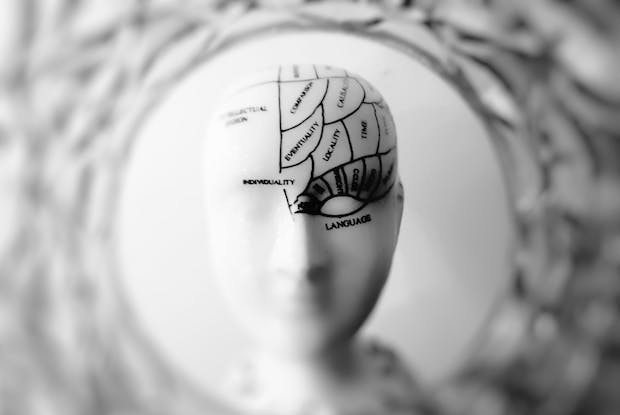Table of Contents
II. What Causes Schizophrenia?
What is Schizophrenia?
Schizophrenia is a chronic brain disorder. It can cause people to experience misrepresentations of reality, such as delusions and hallucinations. In the United States, around 3.5 million people have schizophrenia. [1]
Schizophrenia is a chronic condition that has no cure, although it can be successfully treated with antipsychotic medications. Medications such as Rexulti (brexpiprazole), Abilify (aripiprazole), and Latuda (lurasidone) work by affecting the neurotransmitter dopamine in the brain. Antipsychotic medications can reduce the frequency and severity of symptoms. However, these medications must be taken regularly. Approximately 80 percent of patients that stop taking antipsychotic medications relapse within a year, compared to 30 percent who continue their treatment. [2]
Schizophrenia affects both men and women. Men typically develop the condition during their adolescence and early twenties, while in women, it often begins during the twenties or early thirties. It is estimated that around ten percent of people with schizophrenia will die by suicide within the first ten years of having the disorder. Keep reading to learn about what causes schizophrenia and what can trigger the condition.
Get savings updates for Abilify
What Causes Schizophrenia?
It is not known what exactly causes schizophrenia. However, researchers believe that it is caused by a combination of brain chemistry, genetics, and environmental factors.
People with schizophrenia often have subtle differences in their brain chemistry. These differences can include the way that areas of the brain are connected, as well as the levels of dopamine, serotonin, and other neurotransmitters. It is believed that these differences begin to develop before birth, possibly as a result of exposure to viruses in the womb, or a lack of nutrients consumed during pregnancy. Research into the brain chemistry of people with schizophrenia is ongoing. [3] However, not everyone that has schizophrenia has these brain structural differences. These differences can also occur in people that do not have the disorder. [4] Studies show that schizophrenia often runs in families. However, there is no single hereditary gene that causes schizophrenia. Instead, there are several genes that may increase the risk of developing the disorder, when a person has other risk factors for schizophrenia. For people with a parent with schizophrenia, there is around a 13 percent chance of developing the condition. If both parents have the disorder, this increases to around 40 percent even if the person is raised by others. [5] There are several environmental factors that can also increase the risk of developing schizophrenia. Signs and symptoms of schizophrenia typically appear during late adolescence and beyond. Living in poverty or living in stressful surroundings may potentially contribute to this disorder. [5] Additionally, people who grow up in metropolitan areas are also more likely to be diagnosed with the condition. This is possibly linked to higher levels of poverty, social isolation, and discrimination in cities. [8] As mentioned previously, schizophrenia is caused by a combination of genetic and environmental factors. For those who are at risk, certain triggers can contribute to developing schizophrenia. These triggers do not cause schizophrenia themselves but can trigger the development for someone who is at risk. Studies show that drug abuse can increase the risk of developing mental illnesses, including schizophrenia. This is more likely to trigger the condition when taken regularly during adolescence. Certain drugs that are more likely to cause this disorder include LSD, cocaine, amphetamines, and cannabis. [4] The younger a person takes these drugs, the higher the risk of developing schizophrenia. This is especially true in the development of psychotic symptoms such as hallucinations or delusions. [6] Stress is another psychological trigger of schizophrenia. Large negative life events can cause extreme stress, which may trigger psychiatric conditions, including schizophrenia or post-traumatic stress disorder. These can include the loss of a loved one, losing a job or a home, the end of a relationship, or physical, sexual, or emotional abuse. [4] Schizophrenia symptoms can be split into three categories: psychotic, cognitive, and negative symptoms. Psychotic Symptoms Many people associate schizophrenia with psychotic symptoms. These are ideas or perceptions that may or may not be real. A common psychotic symptom of schizophrenia is hallucinating. The most common form of hallucinating involves hearing voices that are not real. [4] However, people with schizophrenia may also see, feel, smell, or taste things that do not exist. Hallucinations have the same impact as a normal experience. It is possible to have a meta-awareness and to be aware that your hallucinations are hallucinations. However, this is unusual. [5] Another common psychotic symptom is delusions. Unlike hallucinations, delusions do not involve sensing things that do not exist. Instead, delusions involve interpreting and believing something absolutely, despite evidence to the contrary. [3] This can include people believing they are a major celebrity, that a stranger is in love with them, or that they are being stalked or hunted. [6] Other psychotic symptoms can include thought disorders and movement disorders. Thought disorders can cause people with schizophrenia to have disorganized or ‘hazy’ thoughts. Their speech may also be confused or jumbled. [7] Movement disorders may cause patients to seem jumpy or to repeat movements over and over again. Cognitive Symptoms Cognitive symptoms may be more subtle than other schizophrenia symptoms. They can cause people to struggle with everyday tasks. Cognitive symptoms include finding it difficult to pay attention, to make decisions, or to recall memories Negative Symptoms Negative symptoms of schizophrenia are disruptions to a person’s usual emotions and behaviors. These negative symptoms are often the first signs of schizophrenia and may occur several years before the first episode. Negative symptoms may cause someone to withdraw from social activities, hobbies, and interests. People with schizophrenia may also find everyday actions such as showering and performing chores difficult. Patients may speak less and their speech tone and facial expressions may become muted. [2] The content in this article is intended for informational purposes only. This website does not provide medical advice. In all circumstances, you should always seek the advice of your physician and/or other qualified health professionals(s) for drug, medical condition, or treatment advice. The content provided on this website is not a substitute for professional medical advice, diagnosis or treatment.
a. Brain Chemistry
b. Genetics
c. Environmental Factors
Schizophrenia Triggers
a. Drug Abuse
b. Stressful Life Events

Symptoms of Schizophrenia

